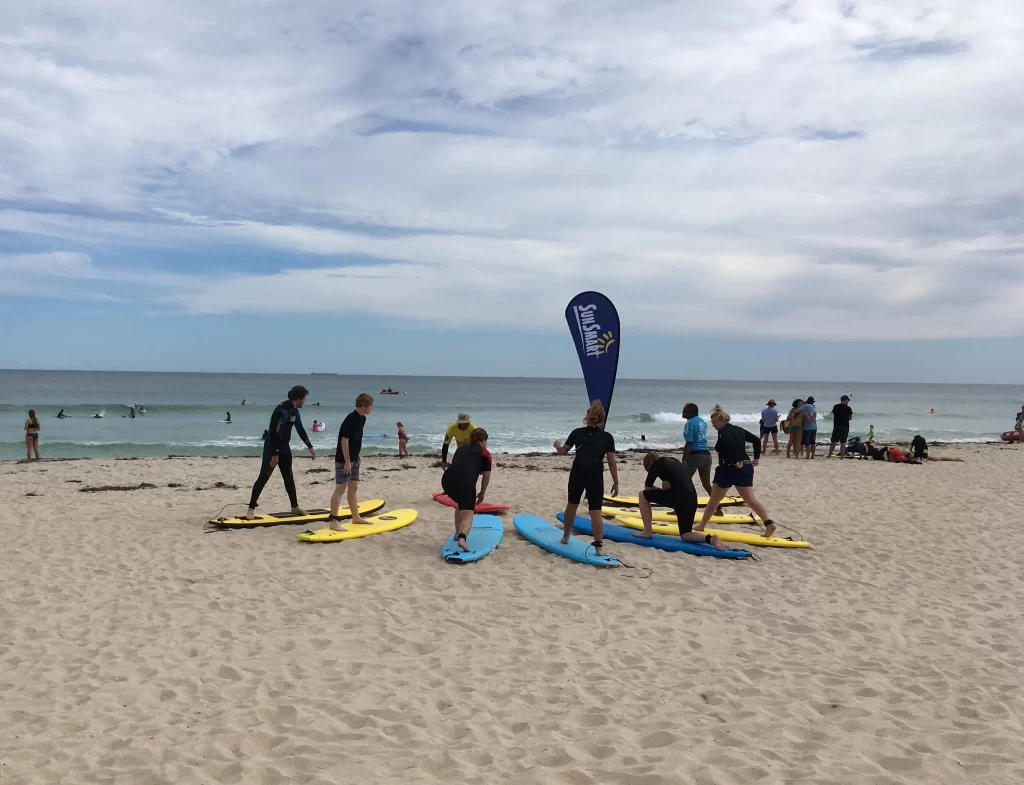
Surfing has an unparalleled impact on people’s lives. The physical, mental, emotional, social and even spiritual benefits are endless. The obsession to surf becomes so strong that many people choose to revolve their entire lives around it. The therapeutic benefits of being in the water, away from the daily stresses or the more significantly difficult events some of those in our community have to face are huge. So what two perfect things to combine! Learn to surf and let the addiction to the sport take over. And at the same time, gain some valuable knowledge and skills around sex and relationships that you will carry through the rest of life. Because although only some people choose their lives to be all about surfing, most people’s lives will be significantly influenced by sex and relationships. So it is essential we get the information we need so we can make the decisions that are best for us.
SurfEd involved heading to Trigg beach each Monday for 4 weeks over April and May, for surf lessons generously subsidised by SurfingWA, before engaging in a short, informal and participant directed education session. This pilot program for young people who may never have the opportunity to learn to surf was organised with and supported by SHQ (Sexual Health Quarters) and The Salvation Army’s Transitional Support Service. At the beach, the young people were making new friends, enjoying the remedial benefits of being in the sun and sea, being physically active, and recognising that it takes time and commitment to build new skills and you will make mistakes along the way.
In the classroom, the group experienced an opportunity to learn in an environment they knew was safe, where they could be themselves and learn at their own pace. It was evident that the eagerness the young people had to learn to surf filtered through to their eagerness to learn about sexual health. They were able to have valuable conversations about what sex and relationships mean to people and why it is important to talk about them. We covered sexually transmissible infections, condoms, contraception, CONSENT, sexting and pornography, talked about hepatitis with HepatitisWA and visited Headspace Osborne Park to discuss staying mentally healthy. However, the real benefits came from the conversation the group was able to have together. By encouraging this in a safe and encouraging environment, we normalised ‘talking sex’ and the group developed some valuable communication skills. As the group discussed, communication is an essential part of any sexual experience and healthy relationship.
On the last day our surf instructor reminded the group “we are constantly learning to surf, no matter what stage we are at, we must always learn and improve”. Much like surfing, we must continue to learn about sex and relationships. We may get better at navigating our way through these significant and meaningful aspects of our lives, but we never stop learning. About ourselves, our partners, what we like, what we don’t, how we can improve from our mistakes and who we want to share these amazing experiences with. Much like every wave you catch will be different from the last, every sexual experience and relationship will be too.
If you are involved in the space of education, think about what you’re passionate about. Because there is no doubt there are young people who will share your passion. Talking about sex and relationships can be daunting and tricky, particularly for young people. Engaging in some form of activity, whether it’s surfing, art, music or whatever else, breaks down the barriers to accessing good education and provides an environment they can relate to, feel comfortable in and want to engage within. Think of yourself as a young person, what would you need to get excited to learn about sex and relationships?


